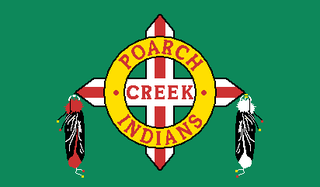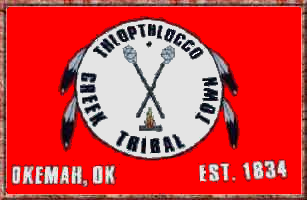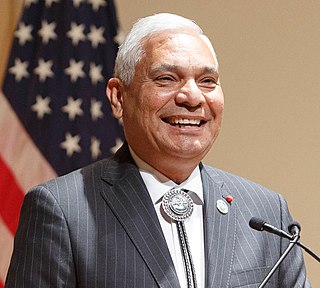
The Muscogee, also known as the Mvskoke, Muscogee Creek, and the Muscogee Creek Confederacy, are a group of related Indigenous peoples of the Southeastern Woodlands in the United States. Their historical homelands are in what now comprises southern Tennessee, much of Alabama, western Georgia and parts of northern Florida.

Okmulgee is a city in, and the county seat of, Okmulgee County, Oklahoma. The name is from the Mvskoke word okimulgee, which means "boiling waters". The site was chosen because of the nearby rivers and springs. Okmulgee is 38 miles south of Tulsa and 13 miles north of Henryetta via US-75.
Northwest Indian College is a public tribal land-grant community college in Bellingham, Washington. It was established by the Lummi Nation and is the only accredited tribal college or university serving reservation communities of Washington, Oregon, and Idaho.

The Muscogee language, also known as Creek, is a Muskogean language spoken by Muscogee (Creek) and Seminole people, primarily in the US states of Oklahoma and Florida. Along with Mikasuki, when it is spoken by the Seminole, it is known as Seminole.
Cankdeska Cikana Community College is a public tribal land-grant community college in Fort Totten, North Dakota, on the Spirit Lake Reservation. The college is accredited by the Higher Learning Commission. The college is named after Paul "Little Hoop" Yankton, a Dakota man who fought and died in World War II; his Dakota name was Cankdeska Cikana.
Nebraska Indian Community College (NICC) is a public tribal land-grant community college with three locations in Nebraska: Macy on the Omaha Tribe reservation, Santee on the Santee Sioux reservation, and the urban South Sioux City.

The College of Menominee Nation (CMN) is a private tribal land-grant community college. Chartered by the Menominee Nation, the college's main campus is in Keshena, Wisconsin; another is in Green Bay, near the reservation of the Oneida Nation of Wisconsin. It is one of two tribal colleges in Wisconsin.

The Muscogee Nation, or Muscogee (Creek) Nation, is a federally recognized Native American tribe based in the U.S. state of Oklahoma. The nation descends from the historic Muscogee Confederacy, a large group of indigenous peoples of the Southeastern Woodlands. Official languages include Muscogee, Yuchi, Natchez, Alabama, and Koasati, with Muscogee retaining the largest number of speakers. They commonly refer to themselves as Este Mvskokvlke. Historically, they were often referred to by European Americans as one of the Five Civilized Tribes of the American Southeast.

The Poarch Band of Creek Indians are a federally recognized tribe of Native Americans with reservation lands in lower Alabama. As Mvskoke people, they speak the Muscogee language. They were formerly known as the Creek Nation East of the Mississippi. The Poarch Band of Creek Indians are a sovereign nation of Muscogee (Creek) people with deep ancestral connections to lands of the Southeast United States.

The Oklahoma State Regents for Higher Education is the agency of the government of Oklahoma that serves as the governing body of the Oklahoma State System of Higher Education, which is the largest provider of higher education in the state of Oklahoma. The State System consists of all institutions of higher education in Oklahoma that are supported by direct legislative appropriations from the Oklahoma Legislature.

Creek National Capitol, also known as Creek Council House, is a building in downtown Okmulgee, Oklahoma, in the United States. It was capitol of the Muscogee (Creek) Nation from 1878 until 1907. They had established their capital at Okmulgee in 1867, after the American Civil War.

Sinte Gleska University (SGU) is a public tribal land-grant university in Mission, South Dakota, on the Rosebud Indian Reservation. It is a Brulé Lakota Indian Reservation home to the Sicangu. SGU has an enrollment of 828 full and part-time students. It is regionally accredited by the Higher Learning Commission.

Thlopthlocco Tribal Town is both a federally recognized Native American tribe and a traditional township of Muscogee Creek Indians, based in Oklahoma. The tribe's native language is Mvskoke, also called Creek.

The Kialegee Tribal Town is a federally recognized Native American tribe in Oklahoma, as well as a traditional township within the former Muscogee Creek Confederacy in the American Southeast. Tribal members pride themselves on retaining their traditions and many still speak the Muscogee language. The name "Kialegee" comes from the Muscogee word, eka-lache, meaning "head left."
Melissa L. Tatum is research professor of law and former director of the Indigenous Peoples Law and Policy Program at the University of Arizona's James E. Rogers College of Law. She previously served as professor of law and co-director of the Native American Law Center at the University of Tulsa College of Law.
The Alabama–Quassarte Tribal Town is both a federally recognized Native American tribe and a traditional township of Muskogean-speaking Alabama and Coushatta peoples. Their traditional languages include Alabama, Koasati, and Mvskoke. As of 2014, the tribe includes 369 enrolled members, who live within the state of Oklahoma as well as Texas, Louisiana, and Arizona.
Navajo Technical University (NTU) is a public tribal land-grant university in Crownpoint, New Mexico, with sites in the towns of Chinle, Arizona and Teec Nos Pos, Arizona. NTU is the largest tribal college in the country and is a 1994 land grant university. It has been accredited by the Higher Learning Commission since 2005 and is home to the first accredited veterinary technician program on an Indian reservation.

James R. Floyd was the chief executive of the Muscogee (Creek) Nation located in Okmulgee, Oklahoma. Floyd won 2,964 votes constituting 62% of the votes in the 2015 general elections, which took place on November 2, 2015, to beat incumbent Chief George Tiger. On January 2, 2016 Floyd was sworn in as Muscogee (Creek) Nation principal chief by MCN Supreme Court Chief Justice Andrew Adams III during an inauguration ceremony at the Mvskoke Dome in Okmulgee, Oklahoma. His term officially began on January 4, 2016.

Shelly Crow was an American nurse and nursing administrator, who worked for the Indian Health Service and was the first Muscogee woman elected to serve in the Muscogee Nation's executive branch. She was fourth elected Second Chief of the nation, serving from 1992 to 1996 in the administration of Chief Bill Fife.













